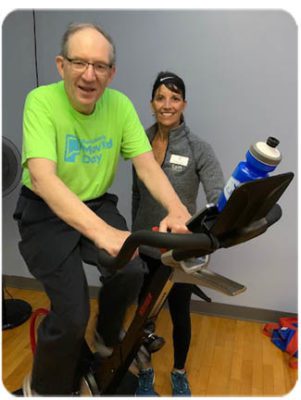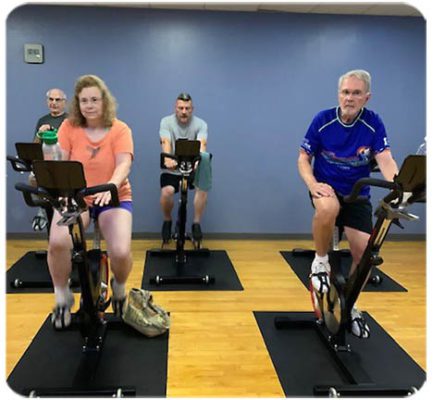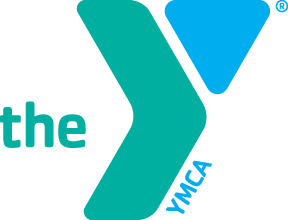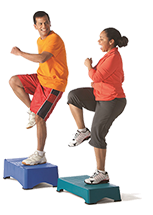Cycling for Parkinson’s
YMCA Receives over $15,000 to Support Program that Safely Pushes Class Members to New Limits, Increases Energy Levels and Balance While Providing Support for Those Dealing with a Parkinson’s Diagnosis.
 In 2018 YMCA member Charlie Matthews was diagnosed with Parkinson’s Disease (PD). Two years prior to his diagnosis, he was experiencing symptoms: difficulty with movements; feeling stiff and weak; and having cognitive issues. “I retired when I was diagnosed. It was earlier than I wanted to leave my job,” he shared. Charlie has been cycling three times a week and enjoys the Y’s Cycling for Parkinson’s program, held at the Merrimack Branch. “There is research that indicates that a regimen of cycling for Parkinson’s is beneficial if you maintain high rpms (80 to 90) for extended periods of times, three or four times a week. It reduces tremors, my head is clearer, I have less fatigue. I’m more flexible… my balance is better,” he said. “Exercise is the only thing you can do to slow the progress of the disease. I’m trying to exercise as much as I can.”
In 2018 YMCA member Charlie Matthews was diagnosed with Parkinson’s Disease (PD). Two years prior to his diagnosis, he was experiencing symptoms: difficulty with movements; feeling stiff and weak; and having cognitive issues. “I retired when I was diagnosed. It was earlier than I wanted to leave my job,” he shared. Charlie has been cycling three times a week and enjoys the Y’s Cycling for Parkinson’s program, held at the Merrimack Branch. “There is research that indicates that a regimen of cycling for Parkinson’s is beneficial if you maintain high rpms (80 to 90) for extended periods of times, three or four times a week. It reduces tremors, my head is clearer, I have less fatigue. I’m more flexible… my balance is better,” he said. “Exercise is the only thing you can do to slow the progress of the disease. I’m trying to exercise as much as I can.”
Parkinson’s disease is a neurodegenerative disorder that impacts dopamine-producing neurons and causes tremors, rigid limbs and balance problems.
When asked about his experience in the Y’s program, Charlie said: “It’s been fantastic. It’s a difficult diagnosis to have. Parkinson’s is a progressive disease and a lot more symptoms happen as time goes on. It’s nice to meet others who are on the same journey. Before COVID when I started with the cycling program, it (being in person) was the best part. Everyone trying to do their best t to maintain their balance, flexibility and strength. For Parkinson’s patients that can barely walk, if you put them on a bike they can ride. It’s a great program. I’m really glad the Y is running it.” Fortunately, the program is now back in person two days per week.
The YMCA of Greater Nashua has been awarded $15,284 toward our specialized indoor cycling program designed for individuals with Parkinson Disease. This was part of The Parkinson’s Foundation’s $2.2 million in community grants supporting programs across the country for local health, wellness and educational programs that address unmet needs in the Parkinson’s disease (PD) community.
“The YMCA of Greater Nashua was approached a few years ago about offering specialized wellness programming for individuals with Parkinson’s Disease,” according to Mike LaChance, CEO of the YMCA of Greater Nashua. “The Y has a number of healthy living programs to support individuals with cancer, pre-diabetes, arthritis and more so this work aligns with our area of expertise and commitment to fulfilling community needs. Specially trained staff and volunteers at the Merrimack Y offer a group exercise program for individuals with PD that focuses on “Forced Exercise” on an indoor stationary bicycle to help reduce symptoms of Parkinson’s disease and it is proving to be quite helpful to many individuals that take the class regularly.”
The Y began a free 12-week session of Cycling for Parkinson’s in March 2018, while its popularity continuing to increase. The class is designed to safely push class members to new limits through “forced” exercise. However, forced isn’t exactly what most people would think. These participants want to be here. The instructors push them throughout the class, checking in, tracking heart rates and revolutions per minute on the bike.
One of the instructors, Colleen Chapdelaine, provided a breakdown of how the sessions run. “The very first class of the session takes a bit of time because we get to know the client. We set them up on the bike, get their measurements and go over the whole bike with them,” she shared.


“We have an instructor’s app on our phone, so I can look at my phone and I can see how everyone is doing with their rates per minute,” she said. This also allows the instructors to test how far the class members are pushing themselves through rate of perceived exertion. The scale for rate of perceived exertion ranges from 1-10. One recognizes very light activity, while 10 is extremely vigorous activity. “If you can talk a bit, that’s how we can see how well you are working. If you can carry a full conversation, pick it up a little bit,” she said.
Colleen said she has heard many success stories from the class members and she added each expressed they felt more tired/fatigued when they began, but now feel as if they have more energy overall.
Some of the comments from participants include:
-
“Coming to cycle classes is better than a support group.”
-
“We feel safe in the studio and can support each other.”
-
“I’m not stumbling as much.” (As well as experiencing a decrease in tremors allowing for handling eating utensils easier.)
-
“I no longer have to use the elevator to get to class in the studio. I can use the stairs.”
-
“I’ve lost 12 pounds since starting the program!”
-
One participant stated handwriting has improved: “I was not able to write in cursive, I had to print to reset my grip on the pen, but now (after attending cycle classes) I am able to write in cursive again.”
Participants overall have stated they have experienced an increase in energy levels and have felt better for the rest of the day, being more productive than before they cycled.
Aside from the physical benefits, the class also serves as a support group. “I feel so honored to be a part of this,” Colleen said. “It’s been great seeing them support one another. Some will get together for coffee after class or go do yoga or aqua aerobics together. And if someone is not in class, we reach out through phone calls and emails.” All participants enter our classes for the first time, nervous and unaware if they could participate due to limitations, but knew everyone in the class also has Parkinson’s disease and would understand, they were not alone. Some participants had more exaggerated symptoms, others no symptoms were visible. Some knew each other from support groups others were new faces but all came together. I observed each participant encouraging others, helping them on and off the bikes, while I was attending the needs of others,” she shared.
Participants have gotten to know each other well. They ask about family and life events and outside activities and hobbies. Each participant has a true concern for the other.
Colleen shared that outside of class, when one participant passed away, several members attended his services to support his wife and daughter. Another participant lost his wife, again the group attended services.
During the pandemic, I began to work with 6 participants (who expressed interest) via ZOOM, working on balance, strength and flexibility to encourage movement and socialization, as some participants have not been able to return due to the progression of the disease and/or resurfacing of symptoms. As of today, we are still working together, via ZOOM, they look forward to “seeing” each other and connecting even virtually.
The indoor cycling program meets Wednesdays and Fridays from 11AM to noon at the Merrimack Branch starting in September. Each participant is able to take one 12-week session at no cost thanks to the support of the Parkinson’s Foundation. This program is considered rigorous exercise and medical clearance to participate is required. For questions and information on how to register contact Kim Adie at kadie@nmymca.org
Stay up to date on what's happening in your community! Subscribe to our blog for events, announcements, and stories.








